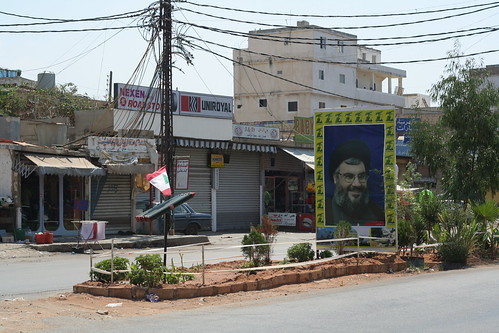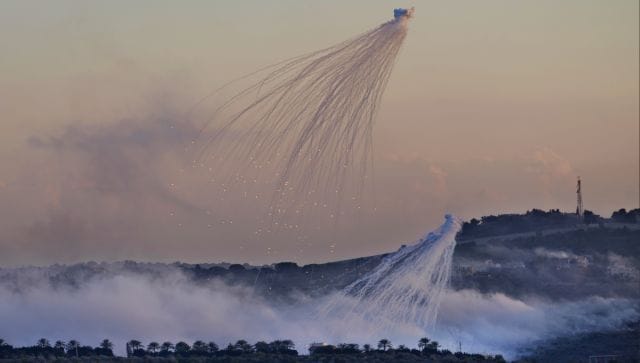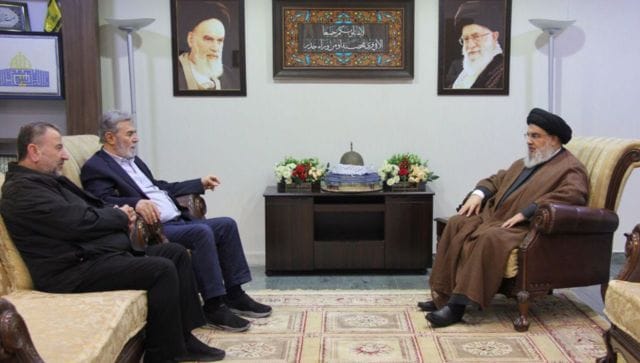Israel-Hamas war: Why Hezbollah leader Hassan Nasrallah’s speech was cause of concern
Nasrallah #Nasrallah

On Friday, Hezbollah chief Sayyed Hassan Nasrallah made his first comments since the outbreak of the Israel-Hamas war.
Nasrallah, speaking from a mystery location, blamed America for the war in Israel and claimed Washington was preventing a ceasefire.
He also claimed that the attack by Hamas was a purely Palestinian operation and that it resulted in an ‘earthquake in Israel’.
He further denied that Tehran exerts any type of control over Hezbollah.
But what’s the role Hezbollah has played since the outbreak of the war? Who is Nasrallah? And what does his speech mean?
Let’s take a closer look:
Hezbollah’s role since conflict began
Hezbollah claimed it was in “direct contact with the leadership of the Palestinian resistance” on 7 October – the day Hamas attacked Israel.
Since the attack, Hezbollah militants have been exchanging fire with Israeli forces along the Lebanon border.
In the initial days of the conflict, the group fired shells at Israel.
Hezbollah said it did so out of ‘solidarity’ with the Palestinian people – though the attacks did not damage.
Hezbollah has deep ties to Hamas, which controls Gaza, and Islamic Jihad, another Palestinian faction backed by Iran.
“The Islamic resistance (Hezbollah)… attacked three positions of the Zionist enemy in the occupied Lebanese Shebaa farms…with large numbers of artillery shells and guided missiles,” the group said.
Senior Hezbollah official Hashem Safieddine said his group’s “guns and rockets” were with Palestinian militants.
“Our history, our guns and our rockets are with you. Everything we have is with you,” Safieddine said at an event in the Hezbollah stronghold of Dahieh on Beirut’s outskirts in solidarity with the Palestinian fighters.
However, things have since heated up with the border witnessing a sharp escalation in violence.
Hezbollah has lost at least 55 of its fighters in exchanges with Israel along the border.
 Lebanon’s militant Hezbollah group, which is backed by Iran, has been engaged in skirmishes with Israeli forces since the beginning of the ongoing conflict. AP
Lebanon’s militant Hezbollah group, which is backed by Iran, has been engaged in skirmishes with Israeli forces since the beginning of the ongoing conflict. AP
Hezbollah in the second week of October took responsibility for an attack in northern Israel near the Hanita kibbutz.
It claimed it had killed or wounded several soldiers and destroyed two tanks and another military vehicle.
A few days ago, Hezbollah said it had for the first time used a surface-to-air missile against an Israeli drone.
Hezbollah on Thursday it mounted multiple strikes on Israeli army positions including its first attack using explosive drones.
The Heavily armed Shi’ite Islamist group said in a statement its fighters launched 19 simultaneous strikes on Israeli army positions in Israel using guided missiles, artillery and other weapons.
Hezbollah said two drones packed with explosives struck an Israeli army command position in the disputed Shebaa Farms area at the border.
Who is Nasrallah?
As per BBC, Nasrallah is a reclusive Shia cleric.
Nasrallah, the secretary-general of Hezbollah, has led the terrorist group since 1992.
Nasrallah’s part in making Hezbollah what it is today, both politically and military, cannot be understated.
Nasrallah has deep ties with Iran.
In 1981, Iran’s first Supreme Leader, Ayatollah Ruhollah Khomeini, named Nasrallah his personal representative in Lebanon.
Nasrallah keeps out of sight in public as he is said to fear assassination by Israel.
However, he continues to deliver televised speeches every week.
Times of Israel quoted Nasrallah as warning Israel in his speech that a pre-emptive strike would be a “stupid mistake.”
“In our front, all options are open,” Nasrallah claimed.
“All the options are open to us and we studied all the options. We must be ready and be ready for all the options that could happen in the future.”
Al Jazeera also quoted Nasrallah as saying those who wish to prevent a regional conflict must halt the war on the Gaza strip.
Nasrallah blamed the United States for for the war in Gaza and the high civilian death toll and that a de-escalation in the besieged enclave was vital to prevent regional war.
The Hezbollah chief thanked groups in Yemen and Iraq, part of what is known as the “Axis of Resistance”. It includes Shi’ite Muslim Iraqi militias, which have been firing at US forces in Syria and Iraq, and Yemen’s Houthis, who have joined in the conflict by firing drones at Israel.
Why did his speech have everyone on alert?
Simply because of his stature within Hezbollah – within which he remains an exalted figure.
The group, an ally of Hamas and which the group took inspiration from, is considered the largest and most heavily armed militant group in West Asia.
It claims to have 100,000 well-trained fighters as well as precision-guided missiles that can hit anywhere in Israel and prevent ships from reaching Israel’s Mediterranean coast.
It also has advanced drones that can either strike or gather intelligence.
Israel estimates that the terror group has some 150,000 rockets and missiles aimed at it.
It fears that Hezbollah’s entry into the war would leave it fighting a battle on multiple fronts.
This in view of Hezbollah having had success against Israel on the battlefront.
In 2006, Hezbollah fought the Israeli Defence Forces to a draw over 34 days.
The war erupted after it crossed into Israel, kidnapping two soldiers and killing others.
Hezbolla fired thousands of rockets into Israel during the conflict, in which 1,200 people were killed in Lebanon, mostly civilians, and 158 Israelis were killed, most of them soldiers.
The result of the conflict against the fearsome IDF led to both Hezbollah and Nasrallah being showered with praise in many parts of the Muslim world.
Hezbollah’s influence on Lebanon cannot also be understated – the group is considered a ‘state within a state’.
Hezbollah also has ministers in government and lawmakers in parliament.
It entered Lebanese politics more prominently in 2005 after Syria withdrew forces from Lebanon following the killing of former prime minister Rafik al-Hariri, who symbolised Saudi influence in the country.
Hezbollah has been a source of inspiration and support for other Iranian-backed groups across the West Asia.
 The head of Lebanon-based terror group Hezbollah, Hassan Nasrallah meeting top officials from Hamas and the Palestinian Islamic Jihad (PIJ).Image courtesy: @EyesOnSouth1/X
The head of Lebanon-based terror group Hezbollah, Hassan Nasrallah meeting top officials from Hamas and the Palestinian Islamic Jihad (PIJ).Image courtesy: @EyesOnSouth1/X
It has trained armed groups in Iraq and taken part in fighting there.
Some feared Hezbollah’s entry may prompt other groups to join in the fighting.
Israel is also worried about Hezbollah – regarding it as its most serious immediate threat.
Which is perhaps why Prime Minister Benjamin Netanyahu warned that Hezbollah starting a war with Israel would be “the mistake of its life”.
In the event of scaled up hostilities, Netanyahu said Hezbollah “will make the mistake of its life. We will strike it with a force it cannot even imagine, and the significance for it and the state of Lebanon will be devastating.”
Others were also worried that Iran, which provides Hezbollah with money and weapons – the US estimates Iran has allocated it hundreds of millions of dollars annually in recent years – could influence the group into joining the battle as a proxy.
Despite Nasrallah’s protestations that it is not influenced by Iran, the group continues to plays a key role in exporting Tehran’s influence across the Muslim world.
Thankfully, Nasrallah did not, as some feared, issue an all-out call to war in his speech.
Still, there was enough to cause concern for many.
Meanwhile, US secretary of state Antony Blinken met with Netanyahu on Friday to urge protections for civilians in the fighting with Hamas, as Israeli troops tightened their encirclement of Gaza City.
Netanyahu has ruled out a temporary cease-fire in the Gaza Strip, saying he will press ahead with a devastating military offensive until hostages held by the Hamas militant group are released.
Netanyahu in a statement released shortly after meeting with Blinken said Israel is continuing with “all of its power” and “refuses a temporary cease-fire that doesn’t include a return of our hostages.”
With inputs from agencies